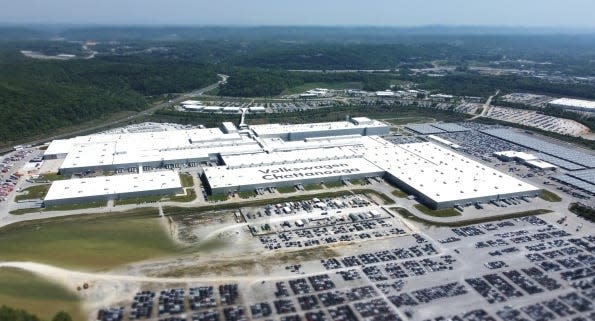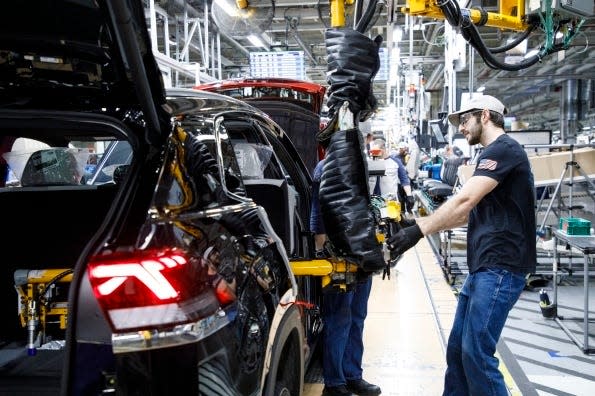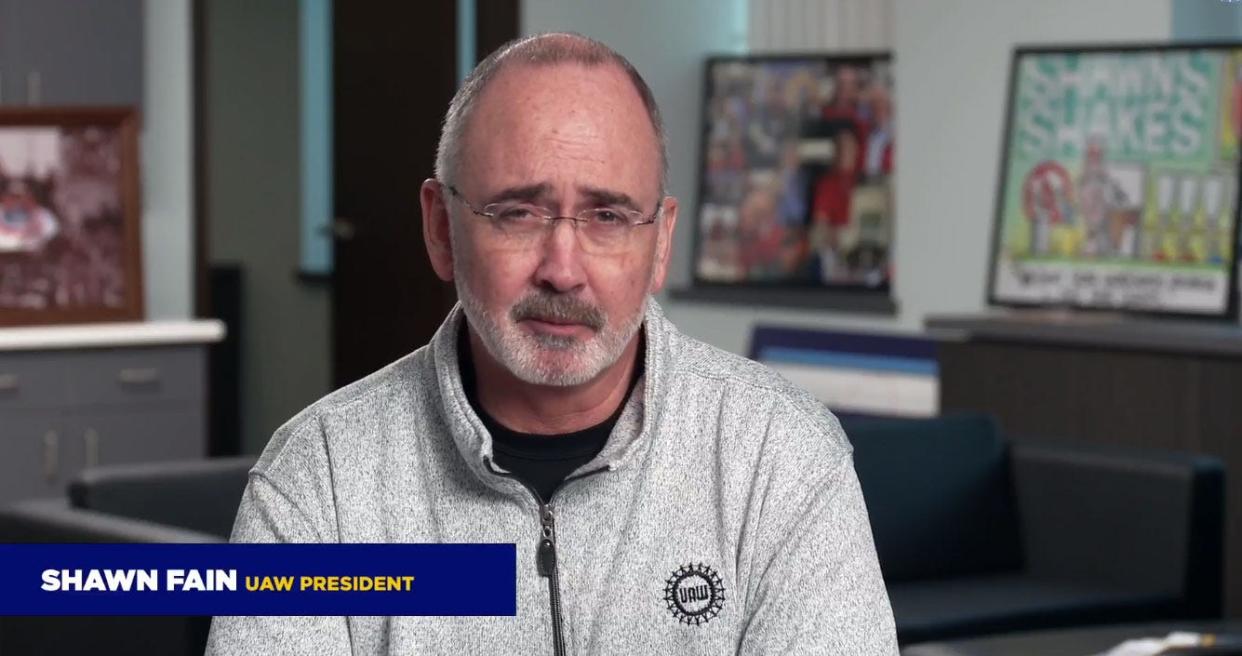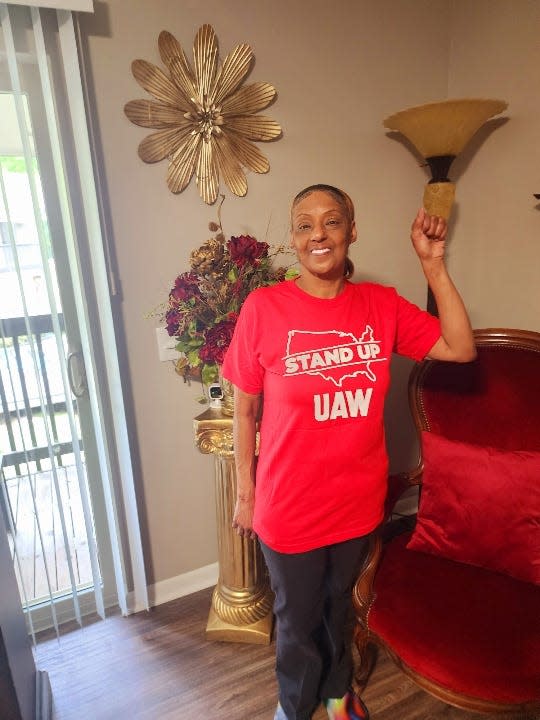UAW scores historic landslide victory to unionize the first foreign automaker in the US
The UAW made American labor history Friday with its biggest organizing win in decades when workers at the Volkswagen Chattanooga plant in Tennessee voted to join the union.
The National Labor Relations Board said the vote was 2,628-985, or 73% approval. The voting started at 4:45 a.m. Wednesday and ran until 8 p.m. Friday.
"In a historic victory, an overwhelming majority of Volkswagen workers in Chattanooga, Tennessee, have voted to join the UAW," union spokesman Jonah Furman wrote in a media statement as the vote-counting was still wrapping up. "... The outcome is clear: Volkswagen workers in Chattanooga are the first Southern autoworkers outside of the Big Three to win their union."

After the vote, UAW President Shawn Fain told reporters at the plant that the vote reflects the fact that working-class people are “fed up with being left behind” and living paycheck-to-paycheck.
"This gives workers everywhere else the indication that it's OK and it can be done," Fain said about organizing the VW plant. "All we heard for years is that we can't do this in the South. And you can. Workers can do it. It's time for workers to take more control of their lives. The only way they can take control of their work lives is by forming a union."
In a statement, VW confirmed the union's victory and said 3,613 votes were cast, which is 83.5% of employees who were eligible to vote.
"Volkswagen thanks its Chattanooga workers for voting in this election," the company said in a statement.
The win is big for Fain because the union tried twice before and failed to organize the plant. This is also the first plant in the U.S. South that the union has ever organized as it looks to unionize 13 other nonunion auto plants. It builds on his momentum from winning big raises after striking Detroit automakers last fall.
@UAW President Shawn Fain tell @VW workers: “Volkswagen family, welcome to the UAW family.” Video by @JoanMcClaneCTFPpic.twitter.com/NQxDEb6Xs5
— Alison Gerber (@aligerb) April 20, 2024
"Fain has been able to pull off what some other union leaders have failed to do with big contract victories," Richard Bensinger, a veteran union organizer who helped lead the Starbucks union campaign and the former national organizing director of the AFL-CIO, told the Free Press. "He has dramatically pivoted from the strikes to organizing. Exciting. Workers I know at both plants say there's overwhelming support, and the politicians are more reticent this time around, I think, afraid of alienating so many Southern union supporters."
Art Wheaton, director of labor studies at Cornell University's School of Industrial and Labor Relations, said the Detroit automakers played a role in the union's victory too.
“By having Ford, GM and Stellantis, after the ratification of the new contracts, immediately go to their stockholders and say, ‘It’s no big deal, we can still be very profitable,’ meant Chattanooga workers didn’t have to listen to the Republican governors who said that a union will shut them down," Wheaton said. "Ford, GM and Stellantis showed that (a rich contract) does not dramatically damage their bottom line and they can still afford to give stock buybacks, give their CEOs big pay checks, and now the workers can afford to buy groceries.”
More: Bill Ford on UAW strike: 'We can stop this now,' urges focus on nonunion automakers
An attempt to thwart the union
On Tuesday, just hours before the voting was set to start, Tennessee Gov. Bill Lee and five other Republican governors in Southern states with nonunion automakers issued a lengthy letter in an attempt to thwart a union at VW Chattanooga. It said they were "highly concerned" about the UAW's unionization campaign, which is "driven by misinformation and scare tactics."
"Companies have choices when it comes to where to invest and bring jobs and opportunity," the governors' letter argued. "We have worked tirelessly on behalf of our constituents to bring good-paying jobs to our states. These jobs have become part of the fabric of the automotive manufacturing industry. Unionization would certainly put our states’ jobs in jeopardy."

The letter did not dissuade workers at the VW plant because Friday’s win at VW was “pretty clear cut that the opposition arguments made by some of the politicians weren’t winning the day,” said Peter Berg, a professor of employment relations and director of the School of Human Resources and Labor Relations at Michigan State University.
But while argument that workers would suffer under collective representation didn’t win the day at VW, Berg questions if it will have sway elsewhere.
The drive behind VW workers signing cards on the UAW's website seeking to join the union followed the UAW's big contract wins against the Detroit Three last fall after a 46-day strike. The union won members a cost-of-living-adjustment, the elimination of wage tiers and bonuses for retirees. Right after the UAW won wage gains of 25% across 4½-year contracts with the Detroit automakers, Nissan, Honda, Hyundai, Toyota and Volkswagen all offered raises of 9% to 14% to their U.S. workforces.
'Fain has broken the mold'
The win shatters the notion that unions can’t organize in the South, said labor expert Harley Shaiken, a professor emeritus at the University of California-Berkeley. It also “really lights up the sky in its ability to inspire” the workers at the dozen or so other nonunion automakers where the union is trying to organize, to seriously consider unionizing, he said.
For Fain, this victory solidifies his leadership. First, he delivered at the bargaining table winning big wage increases and other benefits with the Detroit carmakers and now he has organized where the union has never been able to organize before, Shaiken said.

"Shawn Fain has broken the mold," Shaiken said. "He has done the impossible in quick order by putting in enormous energy and new approaches to work. Saying it can’t be done, he seems to interpret as 'we’ll do it.' "
Wheaton agreed saying Fain's charisma was not as effective as his use of data to support his demands.
“He is a dramatic improvement in terms of saying we’re not going to do things the old way, we’re going to do things the new way and also employ a great use of data in showing, here’s the profits they’re making and what you’re getting,” Wheaton said. “All of America is behind that. The ‘haves’ have plenty and they don’t need to have it all. I think this says a lot about him.”
Beyond Fain’s use of data and well-crafted messaging, he also put up the money to organize. In February, the UAW announced it would commit $40 million to organize workers at nonunion facilities and battery plants.
The addition of some 4,300 workers to the union's roster is good, but what is more important is the standard it sets going forward to win more membership, Shaiken said.
"This is a small step to a single plant that sets a direction that can be transformative," Shaiken said.
A change for America
Bensinger called the victory a “pivotal moment in our nation's history, in that this finally marks the reversal of a 40-year decline in unions.”
Indeed, UAW membership is far below its 1979 peak of 1.5 million. The union currently counts almost 400,000 active members and 580,000 retired members. That decline, labor experts said, hurts the national economy even nonunionized workers.
“When we had strong unions and a large middle class, the auto industry was entirely unionized,” Bensinger said. “Over the past four decades, unionization of the industry sunk to less than 50%. With the unionization of the Southern auto plants, we are beginning the process of rebuilding the middle class. This is great news for our democracy.”
Bensinger said during the Starbucks campaign, he learned the new generation of workers believes in unions and recognizes that organizing is the only way their lives will change.
'I want a union, tell me what to do'
Renee Berry, 58, is pro-union. Berry's job at VW Chattanooga is to deliver vehicle parts to the assembly line. She’s worked there for 14 years. She said she voted “yes” to unionize because having had three surgeries since starting there, she wants improved plant safety. She also wants a pension, better health care and to not have to use paid time off days during mandatory plant shutdowns if she wants to get paid during those shutdown weeks.
Berry believes the only way to get those improvements is with a union. The UAW provided Berry to the Detroit Free Press for comment. Berry was part of the volunteer organizing committee and she helped staff the voting center. She said when she looked out at the lines this week, “All I could see in the line was red T-shirts in support of the union."

Still, having lived through the votes in 2014 and 2019 only to be disappointed at the loss, Berry knew to be cautiously optimistic.
"It’s a lot different this time," Berry told the Free Press. "Third time’s a charm. The people who were on the fence, the things that happened to us earlier, has happened to them now. So now … they can get on board. Now, they say, ‘I want a union. Tell me what I need to do.’ "
VW spokesman Michael Lowder addressed the PTO issues Berry raised, saying summer shutdown week usually occurs during the Fourth of July holiday. So employees would need to use only four PTO days because July 4 is a paid holiday. For the December holiday shutdown, he said the company pays for that time off as company holidays and no PTO is required.
"We understand that PTO is a significant issue and priority for employees. We want them to have work-life balance and are constantly looking for ways to bolster our benefits on this front," Lowder said. "We recently announced a policy change to increase emergency PTO days. Direct feedback from employees via the Engagement Committee helped inform this decision."
Berry spoke to the Free Press earlier in the evening, saying that if the union won the vote, she will “shed tears. It’s going to be emotional, but it’s going to happy.”
And if it fails, Berry said, "We are going to keep on trying. We’re not going to give up. Those who voted against it, something will happen to them to change their mind.”
Up next: Mercedes Benz
The workforce at VW Chattanooga was one of the first nonunion automakers in the country to launch its public campaign to unionize, with 30% of the workers at the plant signing the cards in December. But that didn't guarantee a win.
The UAW has a history of trying to organize but failing in the South, particularly at the Chattanooga plant, which is VW's only plant in the United States. In 2014, the union was confident it would win a vote at the VW plant because it had a majority who had signed cards in favor of a union.
But on Day One of a three-day vote, the Republican leadership of Tennessee mounted a campaign to vote no. The GOP's campaign worked, in part because the former mayor of Chattanooga insinuated that VW would not allocate future products to the plant if it unionized. In 2019, the UAW again narrowly lost a vote at the plant.
Still, MSU's Berg was not surprised that VW was first to vote and it passed, he said.
Up next will be the workforce at Mercedes-Benz plants in Alabama. Both Mercedes-Benz and the UAW agreed to an election, according to the National Labor Relations Board. The vote is set for May 13-17 at the Mercedes-Benz plants in Vance and Woodstock, Alabama.
The vote comes after what was said to be a supermajority of Mercedes-Benz employees at the plants filed a petition earlier this month with the board's Region 10 office in Atlanta seeking to represent about 5,200 production workers.
Fain last month told the Free Press he expects to organize at least one new automaker plant in the country this year, possibly more. Fain said all he needs is one plant to take it to a vote and win to provide the momentum to win more, he said.
Berg said, "Let’s see what happens with Mercedes."
More: GM's top engineer behind Chevrolet's iconic Corvette set to retire after 47 years
Contact Jamie L. LaReau: jlareau@freepress.com. Follow her on Twitter @jlareauan. Read more on General Motors and sign up for our autos newsletter. Become a subscriber.
This article originally appeared on Detroit Free Press: UAW scores win in Volkswagen Chattanooga plant unionization vote
